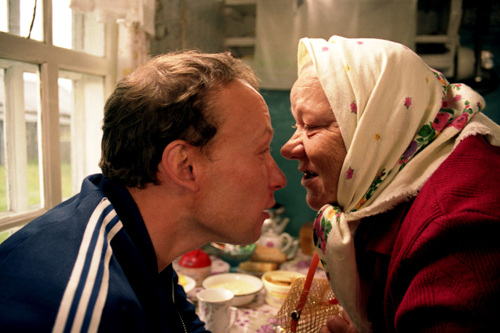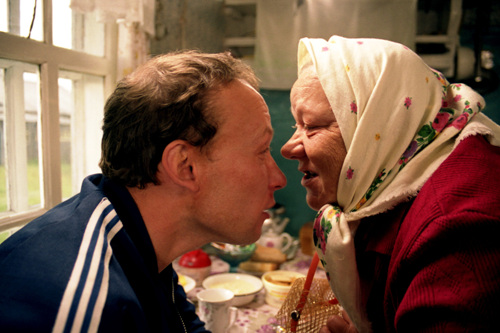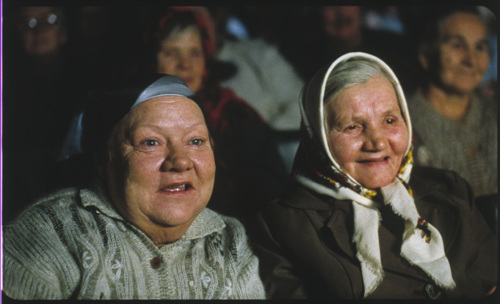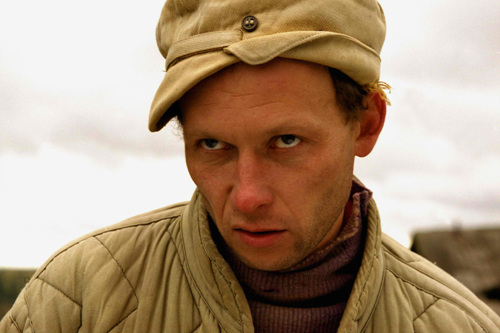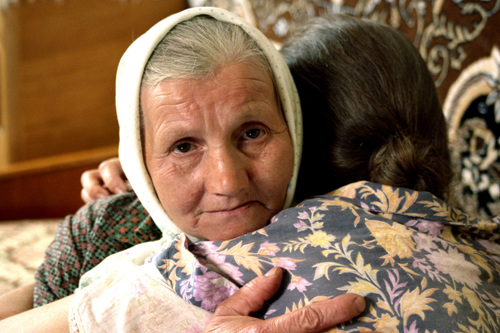6th(2004)
Granny / Baboussia
Lidia Bobrova
- Russia, France
- 2003
- 100min
- 35mm
- color
SYNOPSIS
For her entire life, Granny Tusya has invested herself in taking care of her daughter, son-in-law, grandson and granddaughter. But when, many years later, Vera enters the hospital, son-in-law Ivan forces the now 80-year-old Tusya to sign the house over to the grandchildren and dumps her at her sister Anna’s home. Despite her alcoholic nephew Vitya’s torments, her sister Anna’s warm care manages to keep Tusya in one piece until she hears the news of her daughter Vera’s death. Then Anna breaks her hip and has to go to hospital. Once again, this predicament forces her to worry about a place to stay, and the cold reception she receives upon visiting her son-in-law and two granddaughters drives her to even greater despair. She finally finds a place to stay at her Chechen refugee grandson Tolik’s house, where she leaves behind the gift of a miracle to her great-great-granddaughter Olya who has lost the ability to speak.
Nina Choubina who plays Granny Tusya, is not a professional actor, but the deadpan and sorrow-ridden yet straighforward expression on her wrinkled face gives more depth and strength to her acting. This film presents the lives of the women of old Russia. These are women who had no other choice but to take charge of their families and country during the Second World War without any award or expectation. It is a dedication to these woman, and an analogy and criticism of contemporary Russia where the value of ‘family’ seems to have faded. (Lim Sung-min)
Nina Choubina who plays Granny Tusya, is not a professional actor, but the deadpan and sorrow-ridden yet straighforward expression on her wrinkled face gives more depth and strength to her acting. This film presents the lives of the women of old Russia. These are women who had no other choice but to take charge of their families and country during the Second World War without any award or expectation. It is a dedication to these woman, and an analogy and criticism of contemporary Russia where the value of ‘family’ seems to have faded. (Lim Sung-min)
PROGRAM NOTE
For her entire life, Granny Tusya has invested herself in taking care of her daughter, son-in-law, grandson and granddaughter. But when, many years later, Vera enters the hospital, son-in-law Ivan forces the now 80-year-old Tusya to sign the house over to the grandchildren and dumps her at her sister Anna’s home. Despite her alcoholic nephew Vitya’s torments, her sister Anna’s warm care manages to keep Tusya in one piece until she hears the news of her daughter Vera’s death. Then Anna breaks her hip and has to go to hospital. Once again, this predicament forces her to worry about a place to stay, and the cold reception she receives upon visiting her son-in-law and two granddaughters drives her to even greater despair. She finally finds a place to stay at her Chechen refugee grandson Tolik’s house, where she leaves behind the gift of a miracle to her great-great-granddaughter Olya who has lost the ability to speak.
Nina Choubina who plays Granny Tusya, is not a professional actor, but the deadpan and sorrow-ridden yet straighforward expression on her wrinkled face gives more depth and strength to her acting. This film presents the lives of the women of old Russia. These are women who had no other choice but to take charge of their families and country during the Second World War without any award or expectation. It is a dedication to these woman, and an analogy and criticism of contemporary Russia where the value of ‘family’ seems to have faded. (Lim Sung-min)
Nina Choubina who plays Granny Tusya, is not a professional actor, but the deadpan and sorrow-ridden yet straighforward expression on her wrinkled face gives more depth and strength to her acting. This film presents the lives of the women of old Russia. These are women who had no other choice but to take charge of their families and country during the Second World War without any award or expectation. It is a dedication to these woman, and an analogy and criticism of contemporary Russia where the value of ‘family’ seems to have faded. (Lim Sung-min)
Director
-

Lidia BobrovaLidia Bobrova
"Born in 1952 in Chita, Russia, Lidia Bobrova graduated from the Leningrad State University in history and attended the VGIK film school in Moscow, where she concentrated on writing scenarios. She continued her film studies of writing and directing in the university from 1987 to 1989 and directed Wroslenye in 1988. Among her previous works,
Credit
- ProducerAndrei Zertsalov, Jean Bréhat
- Cast Nina Choubina, Anna Ovsiannikova, Vladimir Koulako
- Cinematography Valéry Revitch
- Editor Tatiana Bistrova
- Music Valse de Serguei Anoufriev
- Sound Maxime Bielovolov

